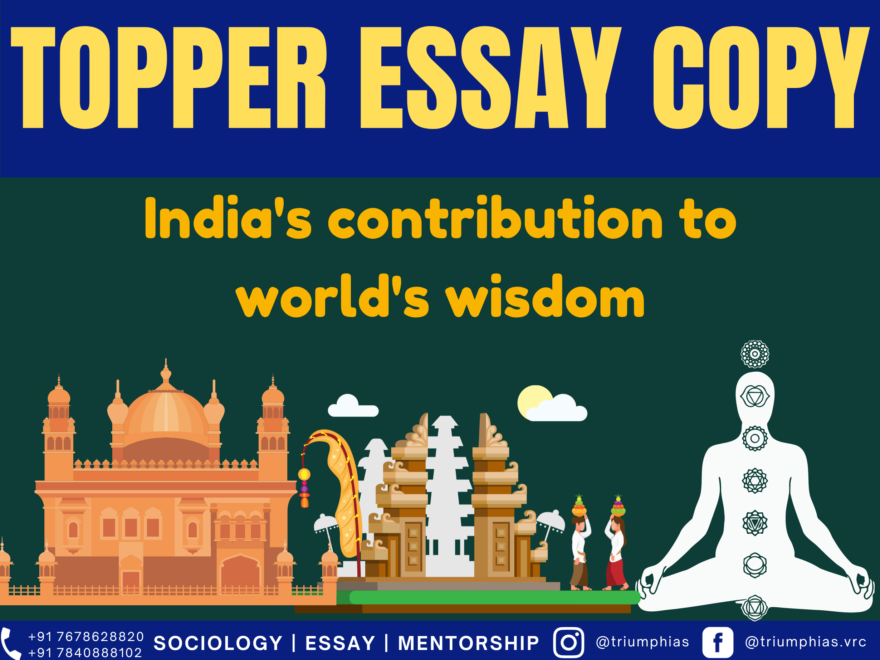IPS, SANKET KUMAR

Essay Topic:
India’s contribution to world’s wisdom
(Relevant for Essay Writing for UPSC Civil Services Examination)
India’s contribution to world’s wisdomIndia is a civilizational state. Over the centuries, it has evolved from being Aryavart, Jumbudweep, Bharat, Hindustan to India. One thing that has remained constant throughout its evolution is the role as the wisdom capital of the world. Across history, India has been a fountain of knowledge, wisdom, and spontaneity in various spheres of life. In this essay, we’ll try to highlight India’s contributions in the past, where we stand now, and how we can proceed with this role. Philosophy has been a core contribution of India to the world. Through its many treatises such as the Vedas, Upanishads, etc., it has shown the world the ideal way to live, interact, and prosper. The message of ‘vasndeva kutumbakam’, which considers the whole world as a family, teaches us to let go of narrow interpretations and, as Tagore has put it, “Not to break the world into fragments of narrow domestic walls.” Similarly, with “Sarve Bhavintu Sukhina, sarve Santu Niramaya”, India sends a message seeking happiness and health for all. It does away with a self-centered and individualistic approach and emphasizes seeing the whole world as one collective that swims and sinks together. India has also been home to the birth of many major religions of the world such as Buddhism, Jainism, Hinduism, Sikhism, Sufi traditions, Shaution, etc. One core theme of all these is a humanistic feature, emphasizing peace, non-violence, service, brotherhood, etc. Buddha, for example, spread the message that ‘Desires’ are the root cause of all sufferings. He proposed a fourfold path to overcome it. Similarly, Mahavira emphasized the virtues of non-violence, satya (truth), asteya (non-stealing), etc., as tenets of life that are to be pursued for a good life. In literature, two of India’s greatest epics—Ramayana and Bhagwatgita—and Silappadikaram and Tolkappiyam from the south hold wisdom that has been a guiding light to the world. The emphasis on living a virtuous life like Ram, to overcome the dichotomy in decision making as Arjuna did on Krishna’s advice, etc., has been a guiding light to millions across the world. In the field of administration, Kautilya’s Arthashastra is considered the oldest and most valuable treatise. It elaborately explains the ‘Duties of the king’, strategies for war and peace, and the basis of good governance and elimination of corruption. Similarly, Ashoka’s ‘Dhamma’ approach to administration, where the enemy now need not be won through war but through knowledge and wisdom. In medieval times, Akbar’s secular policies and the conciliating approach in dealing with people of other faith are lessons for today’s world leaders engrossed in divisive and war/conflict-ridden strategies. Later on, India’s glorious freedom movement under the leadership of Gandhiji that put up its demand for swaraj in peaceful and non-violent ways inspired world leaders from Luther King Jr. to Mandela. The idea of ‘hate the sin, not the sinner’ even won the hearts of many Britishers who supported India in its struggle. India’s contribution could also be highlighted in its long tradition of education. Glorious universities like Nalanda, Odantapuri, Taxila had students and scholars from around the world—e.g., T-sing and Huensang from China. At present too, Indian institutions like IITs, IISC are at the center of groundbreaking research and have contributed to e-education for Asian and African students through ITEC programs. Further, India’s contribution in the wisdom of health is unparalleled. From Sushrut (surgery), Charak (medicines) to the development of yoga (Patanjali) and Ayurveda, India has contributed immensely. At present too, India is seen as the ‘pharmacy of the world’, manufacturing 20% of all generic medicines and has been at the forefront of COVID vaccine research and development—COVAX, Covishield, Covaxin, etc. On the environmental front, India is an example of sustainable and respectful balancing. The Bishnois of Rajasthan and Chipko movement have contributed to the wisdom of balance between consumption and conservation. Further, policies of the Government of India, both domestic and foreign, have contributed to world wisdom. For example, The unity in diversity model pursued in India to give equal rights to minorities and protecting their interests is a lesson to multicultural societies of the world. Similarly, India’s policy of NAM (Non-Alignment), No First Use policy for Nuclear weapons, as first responders to help in cases of disasters, policy of Panchsheel Sagar etc., points to the wisdom of a pacifist culture and non-assertive, cooperative rise. However, despite all the contributions to the world’s wisdom, we ourselves too have deviated from the path. The rise of violence towards minorities and SC/ST (NCRB), sexual assault and harassment of women, criminalization of politics (43% ministers have criminal antecedents), polarizations during elections, rising cases of “sons of the soil” phenomena, the horrors of a rigid caste system, decreasing social security for the old and weak, declining standards of the environment (14 out of 15 most polluted cities of the world are in India), the hatred towards each other as seen on social media, and a shift away from truth (fake news) etc. highlight that it’s high time we revisit our wisdom and learn to inculcate them in letter and spirit. By acting on what we preach, we can gain immensely by creating a better country and also improve the credibility of our wisdom to the world. To be able to achieve this implementation part, the first step needs to be taken at the level of home. Indians should follow their constitutional Duty (Art. 51A) to develop scientific temper, preserve composite culture, respect the environment, protect the rights of women and minorities etc. Along with people, government, private sector, and civil society need to join hands to cleanse politics and administration to re-establish India as “Vishwa Guru”. India and Indians must, “Arise, Awake, and stop not till the goal is reached” (Vivekananda). |
To master these intricacies and fare well in the Sociology Optional Syllabus, aspiring sociologists might benefit from guidance by the Best Sociology Optional Teacher and participation in the Best Sociology Optional Coaching. These avenues provide comprehensive assistance, ensuring a solid understanding of sociology’s diverse methodologies and techniques
Meta Tags:
Urbanisation, Blessing, Disguise, Economic Growth, Cultural Diversity, Environmental Challenges, India, Social Inclusion, Sustainable Development, SDG Goals, Urbanization is a blessing in disguise, Laxman Tiwari, Laxman Tiwari upsc, Laxman Tiwari CSE, Laxman Tiwari Essay copy, Laxman Tiwari Essay test copy

Why Vikash Ranjan’s foundation Classes for Essay?
Proper guidance and assistance are required to learn the skill of writing essay topics in CSE examination. VIKASH RANJAN SIR at TRIUMPH IAS guides students according to the Recent Trends of UPSC, making him the Best Essay Teacher for Essay writing UPSC.
At Triumph IAS, the Best Essay Writing Coaching platform, we not only provide the best study material and applied classes of Essay for IAS but also conduct regular assignments and class tests to assess candidates’ writing skills and understanding of the subject.
Choose The Best Essay Writing Teacher for IAS Preparation and Know our Approach for Essay?
- The Programme is Planned & Executed in a Way that You Write a good Essay for obtaining Effective Score of 140 Plus.
- In this programme we provide Classes on
- How to INTRODUCE The Topic in Context of the THEME of the Essay
- How to Elaborate & Explain the Topic-Theme on Temporal Scale & Sectoral Scale as well as Intellectual Scale in the MAIN BODY of the Essay.
- How to Sum up the Topic in CONCLUSION in Context of the Essay Topic Theme.
- ︎We will Teach You How to use the Knowledge Matrix of General Studies & Optional to write a Good Essay more Logically and Coherently.
- After the Classes You have to “Write to Learn & Learn to Score” .This means You have to Write the Essay Test Papers & Learn from the Feedback & Discussions.
Why Essay is Important and What We Offer in “Essay Test Series”?
- Triumph’s Essay Upgradation Test Series (Under Personal Guidance of Vikash Ranjan Sir) doesn’t only focus on improving student’s linguistic skills but also focus on improving student’s ability to comprehend the topic-sentence (subject) recall & relate the facts, concepts, propose thesis-statements, and logically assimilate the ideas & counter ideas with clarity in expression on temporal & Sectoral Scales of knowledge.
- Further students are provided one-on-one INTERACTION* Session with Vikash Ranjan Sir. Students get personal feedback on their strength and weaknesses, regarding what is ‘good about their essay and what more should be done to make it a better one’ by Vikash Ranjan Sir.
Why to take up this “Essay Test Series and Foundation” Course?
- Essay is Low hanging Fruit. Marks in Essay is Effectively Contributing in Final Selection in New Pattern of Mains Exam. With a Well Developed ‘Knowledge Matrix and Rigorous Practice’, One can Score upto 160 + in Essay. So IAS Aspirants should never Ignore Essay Preparation
- Inculcating Writing Competency in Essay for IAS, which is Different from Essay in English, Essay in School and College.
Follow us :
🔎 https://www.instagram.com/triumphias
🔎https://www.youtube.com/c/TriumphIAS
🔎https://t.me/VikashRanjanSociology
Find More Blogs…
| Compare and contrast Karl Marx’s and Max weber’s | Karl Marx- Historical Materialism |
| Position of Women In the Modern Indian Society | Sociology: Social system and pattern variables |
keyword: India’s contribution to world’s wisdom, India’s contribution to world’s wisdom, India’s contribution to world’s wisdom, India’s contribution to world’s wisdom, India’s contribution to world’s wisdom, India’s contribution to world’s wisdom, India’s contribution to world’s wisdom, India’s contribution to world’s wisdom, India’s contribution to world’s wisdom, India’s contribution to world’s wisdom, India’s contribution to world’s wisdom, India’s contribution to world’s wisdom, India’s contribution to world’s wisdom, India’s contribution to world’s wisdom, India’s contribution to world’s wisdom, India’s contribution to world’s wisdom, India’s contribution to world’s wisdom, India’s contribution to world’s wisdom, India’s contribution to world’s wisdom


